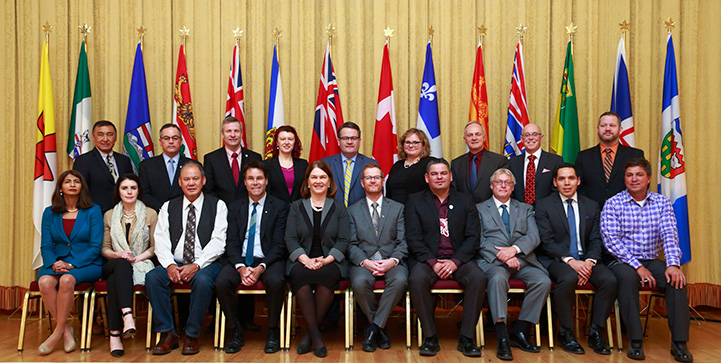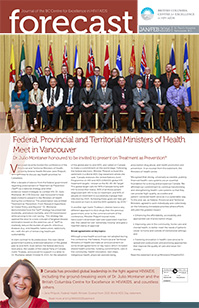
Dr. Julio Montaner honoured to be invited to present on Treatment as Prevention®
Vancouver recently hosted the conference of the Provincial and Territorial Ministers of Health, joined by federal Health Minister Jane Philpott, who gathered to discuss key health priorities for Canadians.
After a decade of silence from the federal government regarding endorsement of Treatment as Prevention (TasP®) as a national strategy and other evidence-based strategies to combat HIV, Dr. Julio Montaner, BC-CfE Director, was honoured to have been invited to present to the Ministers of Health during the conference. The presentation was entitled “Treatment as Prevention: From Research Hypothesis to Global Policy and Beyond.” Dr. Montaner demonstrated how the TasP strategy has prevented morbidity, premature mortality, and HIV transmission while proving to be cost-saving. This strategy has opened the door to a new concept of targeted disease elimination based on the selective use of TasP® to markedly reduce the burden of specific infectious diseases (e.g. viral hepatitis, tuberculosis, addictions, etc.) with the aim of enhancing healthcare sustainability.
In stark contrast to its predecessor, the new Liberal government publicly endorsed adoption of the global plan to end AIDS. Even before the federal elections took place, the Leader of the Liberal Party of Canada, Justin Trudeau, announced his support in a letter to Dr. Montaner dated October 8, 2015, for the adoption of the global plan to end AIDS, and called on Canada to make a commitment on the world stage. Following the federal elections, Minister Philpott echoed this sentiment in a World AIDS Day statement where she said, “Canada endorses the United Nations Joint Programme on HIV and AIDS (UNAIDS) global HIV treatment targets – known as the 90-90-90 Target. This global target calls for 90% of people living with HIV to know their status, 90% of all those people diagnosed with HIV to be on treatment, and 90% of people on treatment to successfully manage their infection by 2020. Achieving these goals will help get the world on track to end the AIDS epidemic by 2030.”
In another sign Justin Trudeau’s Liberals have a very different approach to illicit drugs than the previous government, prior to the commencement of the conference, Minister Philpott toured Insite, Vancouver’s downtown east side supervised-injection site. She called her visit “extremely moving” and gave a heartfelt stamp of approval.
Broad agreements on key topics
Although a new health accord was not adopted during the conference, the Federal, Provincial and Territorial Ministers of Health did make an announcement on some broad agreements on key topics which included: shared health priorities, funding commitments, care in the community, health innovation, next steps, indigenous health, physician assisted dying, prescription drug abuse, and health promotion and prevention. In an excerpt from the statement, the Ministers of Health wrote:
“We agreed that strong, universally accessible, publicly financed health-care systems are an essential foundation for a strong and prosperous Canada. We affirmed our commitment to continue transforming and strengthening health-care systems so that they can provide high-quality, accessible and patient-centered health services in a sustainable way. To this end, we, as Federal, Provincial and Territorial Ministers, agreed to work individually and collectively on the following immediate priorities where efforts will yield the greatest impact:
- Enhancing the affordability, accessibility and appropriate use of prescription drugs;
- Improving care in the community, home care and mental health, to better meet the needs of patients closer to home and outside of institutional settings; and
- Fostering innovation in health-care services to spread and scale proven and promising approaches that improve the quality of care and value-for-money.”
Read the statement at bit.ly/MinistersOfHealth2015.

